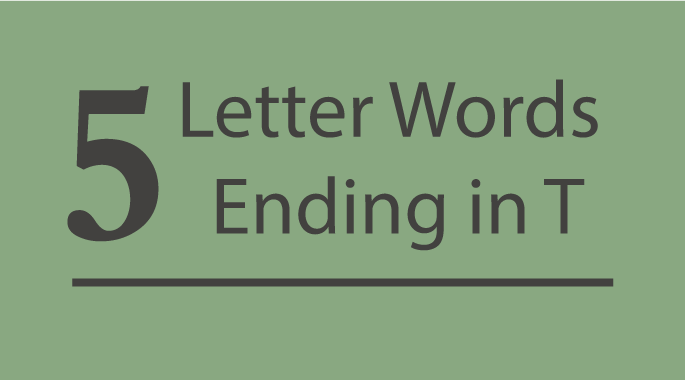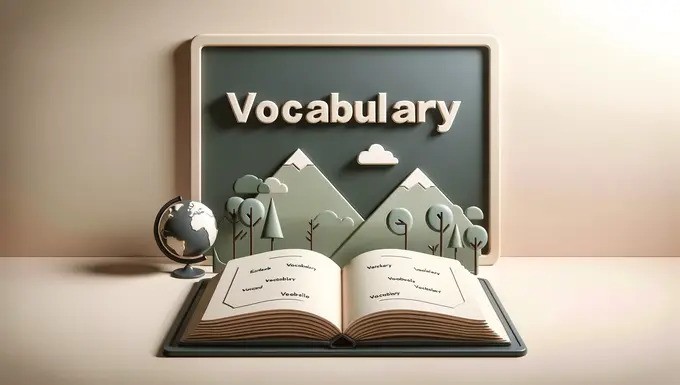
Table of Contents
Introduction
Hey word enthusiasts! Today’s journey takes us through the intriguing landscape of 5-letter words that end with the letter ‘T’. These words are not just a collection of letters; they are keys to expanding our vocabulary and enhancing our communication. Let’s delve into some of these words and discover their meanings and the magic they add to our language.
1. Alert
‘Alert’ means to be watchful or quick to notice any unusual and potentially dangerous or difficult circumstances. It’s about being ready and aware.
- Usage: “The guards remained alert throughout the night.”
2. Audit
An ‘audit’ is a systematic review or assessment of something. It’s commonly used in the context of financial records or business processes.
- Usage: “The company undergoes an annual audit to ensure financial accuracy.”
3. Blast
‘Blast’ refers to a sudden and violent blowing or bursting, often creating an explosion. It can also be used to describe a strong gust of wind or air.
- Usage: “The blast from the demolition could be heard miles away.”
4. Craft
‘Craft’ means to make or construct something with skill and careful attention to detail. It’s often used in the context of art, handicraft, or trade.
- Usage: “She has the ability to craft beautiful pottery.”
5. Drift
To ‘drift’ means to be carried slowly by a current of air or water. It can also refer to a gradual shift in position or opinion.
- Usage: “The boat began to drift away from the shore.”
6. Exert
‘Exert’ means to apply or use (a force, influence, or quality) so as to bring about an effect or result.
- Usage: “He needs to exert more effort to achieve his goals.”
7. Fleet
A ‘fleet’ is a group of ships sailing together, engaged in the same activity, or under the same ownership. It can also refer to a group of vehicles.
- Usage: “The fishing fleet returned with the day’s catch.”
8. Ghost
A ‘ghost’ is an apparition of a dead person that is believed to appear or become manifest to the living, typically as a nebulous image.
- Usage: “The old castle is rumored to be haunted by a ghost.”
9. Inert
‘Inert’ describes something lacking the ability or strength to move. It can also mean a substance that is chemically inactive.
- Usage: “The gas is inert and non-toxic.”
10. Joint
A ‘joint’ is a point at which parts of an artificial structure are joined. It also refers to the physical point of connection between bones.
- Usage: “He suffered an injury in his knee joint.”

A Comprehensive List of 5 Letter Words Ending in T
Here’s a list of 5-letter words ending in T along with their meanings and examples of usage:
- Alert – Fully aware and attentive; wide-awake; keen.
- Usage: “Stay alert while walking in unfamiliar neighborhoods.”
- Ambit – The scope, extent, or bounds of something.
- Usage: “The discussion stayed within the ambit of medical ethics.”
- Audit – An official inspection of an individual’s or organization’s accounts, typically by an independent body.
- Usage: “The company undergoes an annual audit to ensure financial transparency.”
- Blunt – Having a worn-down edge or point; not sharp.
- Usage: “A blunt knife can make chopping vegetables difficult.”
- Chart – A detailed map or diagram.
- Usage: “The captain consulted the chart before setting sail.”
- Cleft – A split or indentation in something (as the palate or chin).
- Usage: “The rock had a deep cleft that was home to several plants.”
- Craft – An activity involving skill in making things by hand.
- Usage: “She has turned her craft of pottery into a successful business.”
- Doubt – A feeling of uncertainty or lack of conviction.
- Usage: “Some doubt lingered in his mind about the decision.”
- Event – A thing that happens, especially one of importance.
- Usage: “The concert was the highlight event of the festival.”
- Exert – Apply or bring to bear (a force, influence, or quality).
- Usage: “He had to exert considerable effort to move the heavy table.”
- Feint – A deceptive or pretended blow, thrust, or other movement, especially in boxing or fencing.
- Usage: “The boxer’s feint confused his opponent.”
- Frost – A deposit of small white ice crystals formed on the ground or other surfaces when the temperature falls below freezing.
- Usage: “A light frost covered the grass early in the morning.”
- Ghost – An apparition of a dead person that is believed to appear or become manifest to the living.
- Usage: “Many believe the old mansion is haunted by a ghost.”
- Giant – An imaginary or mythical being of human form but superhuman size.
- Usage: “The story tells of a brave hero who defeated the giant.”
- Inept – Having or showing no skill; clumsy.
- Usage: “His inept handling of the situation only made things worse.”
- Knelt – Past form of ‘kneel’. Be in or assume a position in which the body is supported by a knee or the knees, as when praying or showing submission.
- Usage: “They knelt to pray every night.”
- Light – The natural agent that stimulates sight and makes things visible.
- Usage: “The room was filled with soft, natural light.”
- Night – The period of darkness in each twenty-four hours; the time from sunset to sunrise.
- Usage: “The stars were clearly visible in the night sky.”
- Ought – Used to indicate duty or correctness, typically when criticizing someone’s actions.
- Usage: “He ought to apologize for his rude behavior.”
- Paint – A colored substance that is spread over a surface and dries to leave a thin decorative or protective coating.
- Usage: “We decided to paint the living room green.”
- Plant – A living organism of the kind exemplified by trees, shrubs, herbs, grasses, ferns, and mosses, typically growing in a permanent site.
- Usage: “She has a small plant in her office for decoration.”
- Quart – A unit of liquid capacity equal to a quarter of a gallon or two pints.
- Usage: “He bought a quart of milk from the store.”
- Quest – A long or arduous search for something.
- Usage: “The adventurers set out on a quest to find the lost city.”
- Quiet – Making little or no noise.
- Usage: “The library is a quiet place perfect for studying.”
- Rivet – A short metal pin or bolt for holding together two plates of metal, its headless end being beaten out or pressed down when in place.
- Usage: “The steel beams were secured with heavy rivets.”
- Slept – Past tense of sleep; be in a state of rest where consciousness is suspended.
- Usage: “She slept peacefully through the night.”
- Smart – Having or showing a quick-witted intelligence.
- Usage: “He’s known for his smart comments and quick thinking.”
- Spent – Having been used and unable to be used again.
- Usage: “The batteries in the remote are spent and need to be replaced.”
- Sweet – Having the pleasant taste characteristic of sugar or honey; not salty, sour, or bitter.
- Usage: “She baked a sweet cake for the birthday party.”
- Twist – Form into a bent, curling, or distorted shape.
- Usage: “She used a tool to twist the wire into shape.”
- Unfit – Not of the necessary quality or standard to meet a particular purpose.
- Usage: “The car was deemed unfit for the road.”
- Visit – Go to see and spend time with (someone) socially.
- Usage: “We plan to visit our relatives this weekend.”
- Waist – The part of the human body below the ribs and above the hips.
- Usage: “The dress was tight around the waist.”
- Wheat – A cereal plant that is the most important kind grown in temperate countries, the grain of which is ground to make flour for bread, pasta, pastry, etc.
- Usage: “The fields of golden wheat were ready for harvest.”
- Yacht – A medium-sized sailboat equipped for cruising or racing.
- Usage: “They spent their vacation sailing on a yacht.”
- Zest – Great enthusiasm and energy.
- Usage: “She tackled the project with zest and creativity.”
- Adapt – Make (something) suitable for a new use or purpose; modify.
- Usage: “Businesses have had to adapt quickly to the new regulations.”
- Brunt – The worst part or chief impact of a specified thing.
- Usage: “The coastal areas bore the brunt of the storm.”
- Crest – The top of something, especially a mountain or hill.
- Usage: “The eagle landed on the crest of the tree.”
- Draft – A preliminary version of a piece of writing.
- Usage: “She completed the first draft of her novel.”
These examples showcase the diversity and usage of 5-letter words ending in T, each with its unique context and application.
Conclusion
These are just a handful of the many 5-letter words ending in T that enrich our language. Each word has its unique flavor and usage, making them invaluable tools for expression and communication. Whether you’re writing, speaking, or playing word games, these words can add precision and color to your language repertoire. Happy word exploring!